- Home
- Mosley, Walter
All I Did Was Shoot My Man
All I Did Was Shoot My Man Read online
ALSO BY WALTER MOSLEY
LEONID MCGILL MYSTERIES
The Long Fall
Known to Evil
When the Thrill Is Gone
EASY RAWLINS MYSTERIES
Blonde Faith
Cinnamon Kiss
Little Scarlet
Six Easy Pieces
Bad Boy Brawly Brown
A Little Yellow Dog
Black Betty
Gone Fishin’
White Butterfly
A Red Death
Devil in a Blue Dress
OTHER FICTION
The Last Days of Ptolemy Grey
The Tempest Tales
Diablerie
Killing Johnny Fry
The Man in My Basement
Fear of the Dark
Fortunate Son
The Wave
Fear Itself
Futureland
Fearless Jones
Walkin’ the Dog
Blue Light
Always Outnumbered, Always Outgunned
RL’s Dream
47
The Right Mistake
NONFICTION
This Year You Write Your Novel
What Next: A Memoir Toward World Peace
Life Out of Context
Workin’ on the Chain Gang
PLAYS
The Fall of Heaven
RIVERHEAD BOOKS
Published by the Penguin Group
Penguin Group (USA) Inc., 375 Hudson Street, New York, New York 10014, USA • Penguin Group (Canada), 90 Eglinton Avenue East, Suite 700, Toronto, Ontario M4P 2Y3, Canada (a division of Pearson Penguin Canada Inc.) • Penguin Books Ltd, 80 Strand, London WC2R 0RL, England • Penguin Ireland, 25 St Stephen’s Green, Dublin 2, Ireland (a division of Penguin Books Ltd) • Penguin Group (Australia), 250 Camberwell Road, Camberwell, Victoria 3124, Australia (a division of Pearson Australia Group Pty Ltd) • Penguin Books India Pvt Ltd, 11 Community Centre, Panchsheel Park, New Delhi–110 017, India • Penguin Group (NZ), 67 Apollo Drive, Rosedale, North Shore 0632, New Zealand (a division of Pearson New Zealand Ltd) • Penguin Books (South Africa) (Pty) Ltd, 24 Sturdee Avenue, Rosebank, Johannesburg 2196, South Africa
Penguin Books Ltd, Registered Offices:
80 Strand, London WC2R 0RL, England
Copyright © 2012 Thing Itself, Inc.
All rights reserved. No part of this book may be reproduced, scanned, or distributed in any printed or electronic form without permission. Please do not participate in or encourage piracy of copyrighted materials in violation of the author’s rights. Purchase only authorized editions.
Published simultaneously in Canada
ISBN 978-1-101-55231-5
Book design by Stephanie Huntwork
This is a work of fiction. Names, characters, places, and incidents either are the product of the author’s imagination or are used fictitiously, and any resemblance to actual persons, living or dead, businesses, companies, events, or locales is entirely coincidental.
While the author has made every effort to provide accurate telephone numbers and Internet addresses at the time of publication, neither the publisher nor the author assumes any responsibility for errors, or for changes that occur after publication. Further, the publisher does not have any control over and does not assume any responsibility for author or third-party websites or their content.
IN MEMORY OF ELSIE B. WASHINGTON,
A QUINTESSENTIAL NEW YORKER AND A LITERARY LIGHT
Contents
Chapter 1
Chapter 2
Chapter 3
Chapter 4
Chapter 5
Chapter 6
Chapter 7
Chapter 8
Chapter 9
Chapter 10
Chapter 11
Chapter 12
Chapter 13
Chapter 14
Chapter 15
Chapter 16
Chapter 17
Chapter 18
Chapter 19
Chapter 20
Chapter 21
Chapter 22
Chapter 23
Chapter 24
Chapter 25
Chapter 26
Chapter 27
Chapter 28
Chapter 29
Chapter 30
Chapter 31
Chapter 32
Chapter 33
Chapter 34
Chapter 35
Chapter 36
Chapter 37
Chapter 38
Chapter 39
Chapter 40
Chapter 41
Chapter 42
Chapter 43
Chapter 44
Chapter 45
Chapter 46
Chapter 47
Chapter 48
Chapter 49
Chapter 50
Chapter 51
Chapter 52
Chapter 53
Chapter 54
Chapter 55
Chapter 56
Chapter 57
1
I’D BEEN RUNNING a low-grade fever for nearly a week. It wasn’t debilitating; more like consciousness-altering. My senses were affected. Sometimes the world looked fuzzy and at other times sounds became muffled, then intense. I could feel myself moving through the heavy atmosphere with the full weight of my one hundred and eighty-three pounds pressing down on the soles of my feet.
Aspirin usually dispelled these symptoms, but I’d left the little plastic box on my desk and couldn’t leave the urine-smelling corner I was in because I was there to meet a client—of sorts.
The lower level of the Port Authority Bus Station at Forty-second Street was populated by young hopefuls on the way to colleges and new lovers on the way to life. Mixed in with the optimists moved also-rans headed anywhere but where they found themselves. Sprinkled in among the civilians were crackheads, along with various policemen, Port Authority employees, and freelance crooks.
A middle-aged man wearing horn-rimmed glasses and toting a clipboard was standing outside a women’s bathroom asking the ladies as they came out if they had any complaints about the facilities. Some were polite, others ignored him, and still others stopped to chat about leaks and smells and the quality or lack of paper products.
The bus was five minutes late, but there weren’t many of us there waiting. Other than myself there were three older women and a younger one. All of us were black but that needn’t have been the case.
Two young men, one black and the other white, started making up rhymes to an imagined beat as they leaned against the red-lacquered tile wall across the way. The plain young black woman, waiting for the same bus I was, stole glances at them.
The rhyming young men were dirty, probably high, and likely homeless—but they were singing and moving to an imagined beat that men had been keeping alive in their breasts longer than there were any buildings or buses—or prisons.
“Excuse me, mistah?” a woman said.
She had amber skin with pecan brown freckles, burnt orange eyes, and an expression that had been spawned when she needed a doting parent to indulge her fears. The fact that she was near sixty had not extinguished the fears haunting her worried inner child.
“Yes?” I said, happy to be distracted from my fevered perceptions.
“Is this the bus from Albion prison?”
“It will be when it gets here.”
She smiled, recognizing the skeptical forecast given by our common poor and working-class ancestors.
“My cousin’s child Missy got out this morning. I figured that if I met her here and bought her a sandwich or a dress or sumpin’ she’d know that some’un cared about her and maybe she’d feel bettah about her chance
s of stayin’ out.”
“I think you might be right about that,” I said. I wanted to say “ma’am” but she was only a few years older than I.
“You got family you meetin’?” she asked, now that we were temporary friends.
“Um . . . no. Not really. I’m here on a job.”
The nameless cousin of the just-released Missy reared back a little and then turned away. I had transformed from a new friend to a potential foe in just a few words.
That was all right with me. The fever had already latched onto her question and was reeling out a story of its own.
ZELLA GRISHAM had tried to kill her boyfriend—shot him three times. But that’s not why she had done eight years of hard time on a sixteen-year sentence.
Some people just had bad luck; in the end, I supposed, all people did.
Hers was a perfectly executed heist, and mine, though I didn’t know it at the time, was her release.
“MISTAH?” another woman said.
She was a third the age of Missy’s cousin, white and pretty in the garish light of the bus depot. With stark white skin, and hair bleached so completely that it blended in with it, she looked like a beautiful ghost looking for souls in that limbo of the Port Authority.
“Yeah?” I said.
“You want a date?”
“I gave up rutting in public corners when I dropped out of high school the second time. That was back before your mother was out of diapers.”
“I got a key to a janitor’s closet upstairs,” she replied, unperturbed. “You can’t lie down, but there’s a chair, and a chain to make sure we’re not interrupted.”
“How’d you get that?” I asked—professional curiosity.
“I keep the janitor happy and pay him thirty dollars a day. It cost you twenty-five for a blow job.”
The fever had many facets. It was a fount of revelations but also violent. A depth charge went off in the sea of my mind when that child said the words indicating the act she was willing to perform. The muscles in my abdomen twisted and I sneered with anticipated satisfaction.
“I could see you interested,” she said in that knowing way of youthful power.
I took in a breath, searching for the right words.
“I got a condom you could wear if you afraid’a disease,” she added.
I rarely go to prostitutes, but I hadn’t had sex in months. My wife had other interests, and my girlfriend let me go for the sake of her sanity.
“I’m, I’m waiting for someone,” I said, smiling at the rare stammer in my voice.
“They could wait,” the ghoul hissed.
The fever had associated itself, at that moment, with my soul; the soul I didn’t believe in. It felt as if she, this ethereal denizen of the bus station, could suck the fever and the spirit right out of me. It sounded like relief so profound that for a moment I considered following her up to the janitor’s closet.
“Missy, girl! You look healthy, child.”
The words entered my head in an abstract way, this because the young prostitute was looking directly into my eyes. Hers were ice blue, unforgiving and yet laser-like in their wordless understanding of my needs.
Man is an animal, Trot, my old man used to say, never forget that.
“Alyssa!” a woman cried out.
“Mama!” another woman shouted in a husky voice.
“You want it?” the young prostitute whispered.
I was ready to go with her, at least I wanted to be ready, but then I saw the woman I’d talked to earlier walking away with a young dark-skinned woman wearing jeans and a bright green T-shirt two sizes too large.
I looked around and saw that the bus had arrived and disgorged at least part of its complement. Young and not so young women were walking toward the upward-leading stairs, elevators, and escalator. Only the ones met by loved ones were smiling.
I turned my back on the white woman to look at the door to the bus port.
She was coming through, sporting red hair and an orange rayon pantsuit. The rucksack she carried was drab green and the look on her face was sour.
“Zella!” I shouted.
I raised my heavy mitt to wave her toward me. She reared back as Missy’s cousin had done and then cautiously leaned in my direction.
I turned then to apologize to the young white woman. But she was gone. I looked up to see where to, but it was as if she had evaporated in the few seconds that had elapsed.
It was then that I worried that there was more to the fever than I had believed. Could I have hallucinated the whole encounter? Were my desires and distractions driving me mad?
That question would have to wait for the moment, however.
I had a job to do and she was standing a few feet away, glowering at me like so many others in my long life of misdeeds.
2
“DO I KNOW YOU?” Zella asked as I approached her. Her coarse red hair was combed back but otherwise untamed. It wanted to stand up like porcupine quills or an angry cat’s back.
There was an unmistakable ripple of violence in her body language—no doubt learned at her previous stint in the women’s maximum security prison at Bedford Hills, before her transfer to the milder setting of the Albion facility.
This is Zella Grisham, Gert Longman’s words rang in my ears from nine years before.
It was a photograph taken to fit in a wallet. I had already seen her on the front pages of the Post and the Daily News. That face had adorned the upper half of the front page of the B section of the Times too.
“No,” I said in answer to Zella’s question. “I was sent here by Breland Lewis. He asked me to meet your bus to—”
“Lewis? That’s that lawyer, right?”
“Yes. He asked me to—”
“Tall black guy,” she said.
“ White,” I said, “and short. Even shorter than I am, with no bulk either.”
Zella was thirty-six and no longer pretty as she had been before her incarceration. There were three strands of gray that I could see. She took that moment to tie the mane back with a black elastic designed for that task.
“And he sent you?” It was more an accusation than a question.
“He had a court case today but wanted somebody to meet you when you got in.” It sounded like a lie, even to me.
“He didn’t say that he was going to send anybody,” she said, “or come himself, for that matter.”
I wanted to answer but there was really nothing to say. I was standing right there, obviously to meet her.
“I don’t even know why he’s helping me,” she added in a tone that undercut her words. “I mean, he was right. I didn’t belong in prison. All I did was shoot my man when I found him with his dick in my best friend, in my bed, under the quilt that my Aunt Edna made for me.
“But even so there’s a lotta women locked away when they shouldn’t be. A lotta women separated from their family . . . their children . . .”
She stopped at that point. I knew why. If we had been friends I would have put a comforting hand on her shoulder.
“Breland didn’t tell me anything but to come and meet you here,” I said—the words echoing in the chambers of my fevered mind.

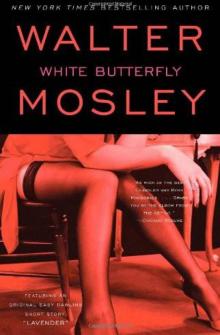 White Butterfly
White Butterfly Debbie Doesn't Do It Anymore (9780385538398)
Debbie Doesn't Do It Anymore (9780385538398)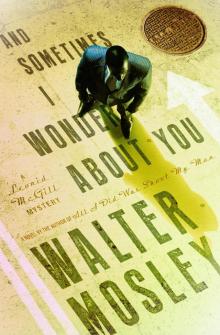 And Sometimes I Wonder About You : A Leonid Mcgill Mystery (9780385539197)
And Sometimes I Wonder About You : A Leonid Mcgill Mystery (9780385539197)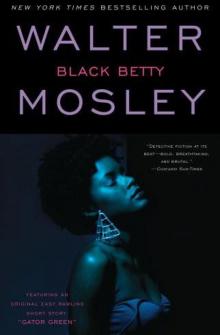 Black Betty
Black Betty All I Did Was Shoot My Man
All I Did Was Shoot My Man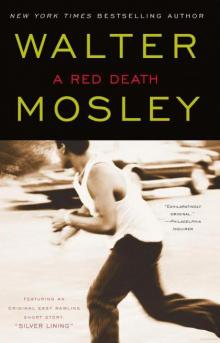 A Red Death
A Red Death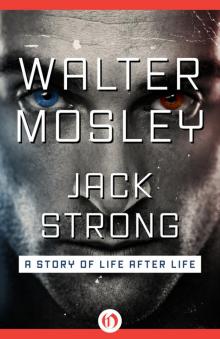 Jack Strong: A Story of Life After Life
Jack Strong: A Story of Life After Life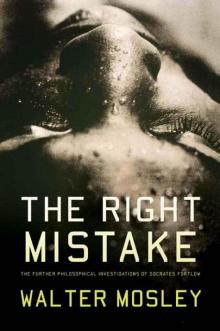 The Right Mistake
The Right Mistake